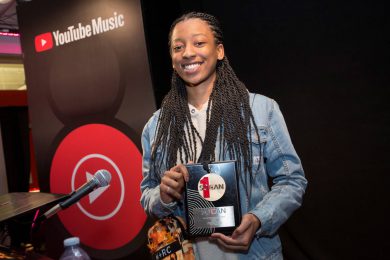Ebony “WondaGurl” Oshunrinde may be the Queen of the Beats, working with everyone from Jay Z to Drake to Don Toliver to Killy, but don’t ask her where they originate. It’s a bit of a mystery, even to her.
“It can come in so many different ways,” says WondaGurl from Los Angeles, her home for just over a year. “It could be an idea that I had in my head the whole day; it could be something I voice-noted. Or maybe I’m just going through samples on the computer, and I start a beat from there. Or it could be that I’m sitting somewhere, out for dinner, and I hear some sample in a nightclub in the spot that I’m in, and I go home and make a beat out of it.

WondaGurl, receiving a SOCAN No. 1 Song Award in 2017, for co-writing Travi$ Scott’s “Antidote.”
“It can happen in so many different ways for me, and it’s not really one thing that I’m looking for. And I can’t really explain it – it’s hard for me to explain the technical side of that.”
Seriously though, WondaGurl isn’t in a position where she necessarily has to explain her magic: at only 23 years old, the native of Scarborough, Ontario, is still enjoying the momentum she’s generated since unexpectedly landing one of her beats on “Crown,” a last-minute addition to Jay-Z’s 2013 million-selling album Magna Carta Holy Grail.
With hip-hop visionaries Travi$ Scott and Matthew “Boi-1da” Samuels in her corner as mentors (her “WondaGurl” moniker is a female twist on Boi-1da), Oshunrinde has apprenticed on the front lines, providing beats for rap elitists like Drake (“Used To” and “Company” on If You’re Reading This, It’s Too Late), Travi$ Scott (“Antidote”), the late Pop Smoke (two songs on Shoot For The Stars Aim For The Moon), Quavo, Lil Yachty, Killy, and Big Sean. Most recently, she was responsible for half the tracks on Don Toliver’s Heaven or Hell, including the three-million-selling single “No Idea.”
There’s also been some pop spillover, most notably as a co-writer and co-producer of Rihanna’s “Bitch Better Have My Money,” Mariah Carey’s “Caution,” and a remix of Maroon5’s “Girl Like You.”
It’s this enviable track record that drew Sony/ATV to WondaGurl, signing a global co-publishing deal through Travi$ Scott’s Cactus Jack publishing, and allowing her to establish her own label imprint, WondaChild, to which she’s signed Toronto rapper Jugger.
“Still, to this day, I’ll learn about a placement literally the day it comes out”
WondaGurl, who prefers FL Studio software when composing her beats, probably figures the prestige would have earned her some breaks when dealing with the music business. But apparently, that’s not the case. “Still, to this day, I’ll learn about a placement literally the day it comes out, you know?” she laughs. “It really happens.”
Even interested artists sometimes keep her in the dark. “Usually, you don’t hear from them for awhile,” she explains. “If they listen to it right then and there, they’ll tell you which beats they like and what they want to hold. Usually, you don’t hear from them for awhile, though.”
Although WondaGurl obviously receives requests to supply beats, but she also still chases certain artists when she thinks she has a beat with a good fit for them. “Usually, I send out a whole [sample] pack of beats,” she says. “But if I have a beat where I hear this person on it, I’ll just send it straight to them, that one beat. It goes both ways – a lot of people approach me, and I still approach people the way I did years ago.
“When I start the beat, I may not have someone in mind, but after I make it, I can kind of hear who I want to send it to.”
Lockdown Slowdown
You’d think that enforced isolation might stir the creative juices, but even WondaGurl is feeling vulnerable while living in L.A. “COVID-19 has been better for my creativity, because it’s been a little nerve-wracking on a daily basis,” she says. “And then with everything that’s going on in the world today, it’s been a little hard to just focus on creating.”
As a woman who’s constantly experimenting behind the console, it would make sense that WondaGurl might be close to inventing her own software, or series of loops. But if that’s the case, she’s keeping it close to her vest. “There’s definitely a lot of different things – mainly technology stuff… I just don’t like talking about things,” she admits. “Especially where it’s just an idea, and I’m trying to figure out how to do it. I want to get to a point where I’m an executive, and just a boss.”
One project that she’s willing to talk about is her own album, that she hopes will clarify and define her own sound for her peers. It’ll involve singers and rappers Savannah Ré, Baby Rose, and Yung Baby Tate, among others.
“It’s just something that I wanted to do for everybody, where it’s all produced by me, and you can just hear how something would sound as if it was completely released by me,” says WondaGurl. “I always wanted to really show people what my sound is, in my opinion, because I still feel like people don’t know. But I plan to have features on it and different producers.”
As for trade secrets, WondaGurl says there a number of things that ensure her creative and professional happiness. “Kind of keeping the right people around me and making sure that I’m in the space that I need to be in is the most important thing that I’ve learned recently,” she says. “Obviously, staying humble and just knowing how to act in the studio are other things I’ve learned. But probably the most important thing is just the people that you keep around you.”